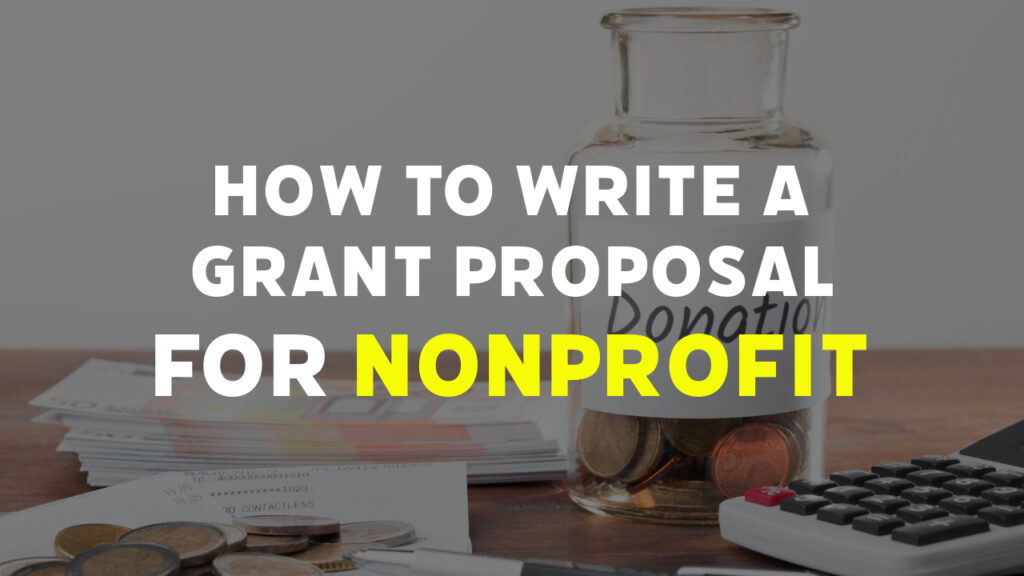How To Write a Grant Proposal For Nonprofit

Securing funding through grants is an extremely important aspect of sustaining and expanding the impact of nonprofit organizations. These grants are sources of funding given to nonprofit organizations by foundations, corporations, government agencies, and other entities to help these organizations achieve their missions.
This guide will explore how to write a grant proposal for nonprofits. We’ll discuss the importance of researching potential funders, identifying your organization’s strengths and needs, crafting a clear and concise proposal, and presenting a detailed budget.
Writing a compelling grant proposal is the key to successfully obtaining financial support for your mission. Writing a grant proposal can seem overwhelming, but it can be a manageable and fruitful experience with proper guidance and practical strategies.
We’ll also provide tips and tricks for presenting your organization in the best possible light and making your proposal stand out. With the help of this guide, nonprofit organizations can develop compelling grant proposals that will help them secure the funding they need to achieve their goals and positively impact their communities.
Table of Contents
Understanding the Basics of Grant Writing
How to Write a Grant: Fundamentals to Get Started
Begin by understanding the essential elements of a grant proposal:
- Define Your Project or Program:
- When defining your project or program, it is essential to articulate its purpose, goals, and objectives clearly and comprehensively.
- Use descriptive language that effectively conveys the significance of your initiative and how it aligns with your overall mission, vision, and values.
- Additionally, consider the key strategies and tactics you will use to achieve your goals and outline the specific actions you will take to bring your project to fruition.
- By providing detailed and comprehensive information about your project, you can ensure all stakeholders are on the same page and working towards a common purpose.
- Identify the Right Funding Opportunity:
- To identify the right funding opportunity for your nonprofit organization, conducting thorough research and selecting grants that align with your mission and goals is essential.
- This will increase your chances of being selected for funding.
- Once you have identified potential funding opportunities, crafting your proposal to the specific requirements of each grant is essential.
- This means carefully reviewing the guidelines and instructions for each funding opportunity and ensuring that your proposal addresses all the criteria.
- Additionally, it’s essential to highlight your nonprofit’s unique aspects and the impact your organization has had on the community.
- This will help differentiate your proposal from others and show why your organization is a worthwhile investment for potential funders.
- By taking these steps, you can increase the chances of securing the funding you need to continue making a difference.
Preparing an Effective Grant Application
How to Write a Grant Application: Step-by-Step Process
Follow these steps to create a well-structured grant application:
- Introduction:
- Provide a concise overview of your nonprofit organization.
- Clearly state the purpose of your grant application.
- Executive Summary:
- Summarize the key elements of your project or program.
- Highlight the expected outcomes and impact.
- Statement of Need:
- Define the problem or need your project aims to address.
- Use data and statistics to support the urgency of your cause.
- Goals and Objectives:
- Clearly outline the specific goals and measurable objectives of your project.
- Ensure they align with the funder’s priorities.
- Methods and Strategies:
- Detail the methods and strategies you will employ to achieve your goals.
- Provide a timeline for project implementation.

Writing a Grant Proposal for Nonprofit Success
How to Write a Grant Proposal for Nonprofit: Essential Components
- Budget and Financial Information:
- Clearly outline the budget for your project.
- Provide a detailed breakdown of expenses and expected outcomes.
- Evaluation Plan:
- Describe how you will measure the success of your project.
- Include both quantitative and qualitative evaluation methods.
- Sustainability and Future Plans:
- Explain how your nonprofit will sustain the project beyond the grant period.
- Outline plans for expansion or replication.
Section 4: Polishing Your Grant Proposal
Writing a Grant Proposal: Final Touches for Maximum Impact
- Language and Tone:
- Use clear, concise, and compelling language.
- Maintain a professional and persuasive tone throughout.
- Proofreading and Editing:
- Thoroughly proofread your proposal for errors and inconsistencies.
- Seek feedback from colleagues or mentors for additional insights.
Several key factors must be remembered when writing a grant proposal for nonprofits. First and foremost, a strategic approach is essential. This means taking the time to carefully consider your organization’s specific needs and goals and the priorities and requirements of the funding organization you are applying to.
In addition to a strategic approach, attention to detail is crucial. This includes everything from formatting and organization to grammar and spelling. A well-written proposal that is easy to read and understand can go a long way in demonstrating your organization’s professionalism and competence.
Perhaps most importantly, a successful grant proposal requires a deep understanding of your organization’s mission and goals. This means clearly expressing your nonprofit’s purpose and the impact you hope to make in your community.
A strong proposal will effectively communicate this mission and show your organization’s commitment to creating positive change.
By following a comprehensive guide on writing a grant proposal, your nonprofit can increase its chances of securing the funding needed to make a meaningful impact in your community.
Remember, a well-crafted proposal is not only about the content of the proposal itself but also about the impression it leaves on the funding organization.
By demonstrating your organization’s expertise, professionalism, and dedication, you can set yourself apart from other applicants and increase your chances of success.

